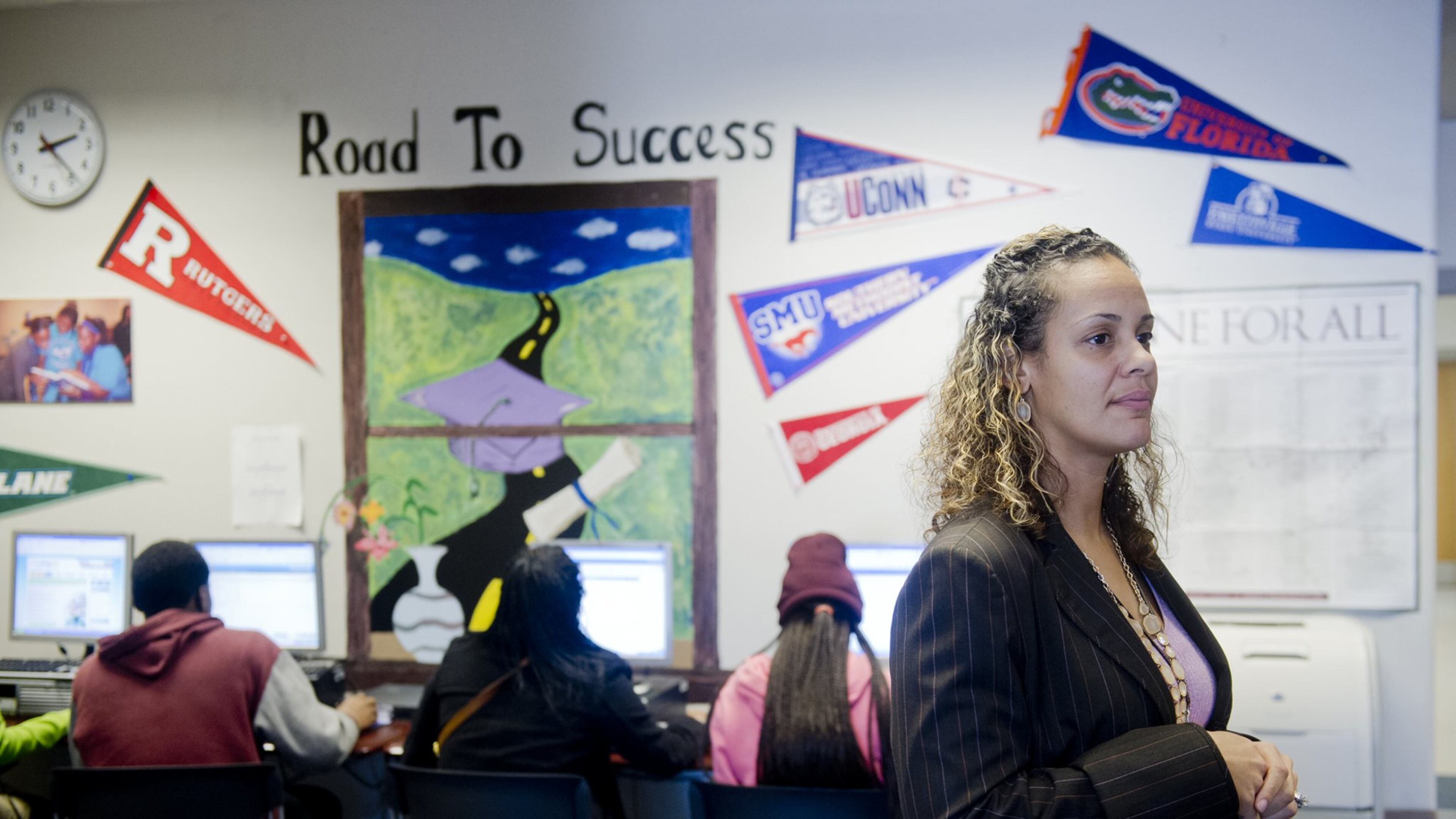Efforts to prevent dropouts get results

Metro Atlanta graduation rates
District…2012…2013
Atlanta…50.9%…58.6%
Buford…84.9%…90.3%
Cherokee…72.7%…78%
Clayton…53.6%…55.8%
Cobb…76%…76.5%
Decatur…89.8%…93.9%
DeKalb…57.3%…58.9%
Fayette…85.5%…87.3%
Forsyth…87.8%…89.5%
Fulton…71.3%…75.5%
Gwinnett…71%…72.7%
Henry…75.5%…78.5%
Rockdale…72%…78%
With barely half of its students graduating high school in four years, Atlanta schools stepped up efforts to keep kids in class.
The focus on reducing dropouts paid off, both in Atlanta Public Schools and in suburban school systems nearby, where graduation rates were up across the board, according to 2013 data released by the state this month.
Graduation coaches helped students when they failed classes, didn’t show up to school or had discipline problems. Online programs allowed students to retake courses rather than fall further behind. Career pathways gave students a life goal following high school.
But graduation rates didn’t always go up because more students wore the cap and gown — sometimes numbers rose because schools were able to track students down. Schools got credit if they could prove that students who withdrew later went on to graduate somewhere else.
Every Atlanta-area school district improved graduation rates from 2012 to 2013, with the biggest gain taking place in Atlanta Public Schools, where four-year graduation rates reached 59 percent, a stark improvement from 51 percent in the previous year.
Atlanta schools put a graduation coach in every high school and middle school, launched the Atlanta Virtual Academy for online credit recovery and tried to catch up with students who went missing from school.
Cinzia Thomas, a graduation coach at South Atlanta High School, said she and classroom teachers provide one-on-one student support, with programs including makeup courses offered online on school computers, alternative schools and Saturday school.
“We all know who all the students are as they move through school. We make sure they’re on track. We’re realizing there are alternatives for our students,” Thomas said. “To get parent support, sometimes it takes home visits. We know we have to go above and beyond. We can’t just give up.”
South Atlanta High graduated 78 percent of its seniors in four years, a 10 percentage point increase over the previous year.
Across town at North Atlanta High, 80 percent of students graduated, a giant increase from its 61 percent graduation rate the year before.
Educators at both schools relied on an unlikely ally to boost their numbers: Facebook.
Thomas and North Atlanta High Principal Gene Taylor both said they used the social media website to find students who had left their schools and later graduated from a different school, raising their original school’s graduation rate.
“One of the most important things any school can do is track down the students who started at your school as freshmen and left sometime before graduation day, and find out where they went,” Taylor said. “Most of those students went to another school. We were able to track them down and ensure they weren’t a dropout.”
Georgia’s graduation rate inched up 2 percentage points last year, to 71.5 percent, which is still likely one of the lowest rates in the nation. Only Nevada and New Mexico graduated fewer students than Georgia in 2011, but since then, state-by-state comparisons have become more difficult because states release their graduation rates at separate times.
The state made a short-lived coordinated effort to combat poor graduation rates several years ago, when the Legislature during Gov. Sonny Perdue’s administration spent tens of millions of dollars to put graduation coaches in high schools and middle schools. But that program lasted only three years before it was eliminated in 2009, when lawmakers cut $49 million from the state budget that had been set aside for graduation coaches.
School systems adopt various strategies to keep students in school based on their different needs, starting with instructional efforts that engage all students, and growing more specific for students struggling academically, disciplinarily or criminally, said Cairen Withingson, assistant director for the National Dropout Prevention Center/Network at Clemson University.
“It’s not a one-size-fits-all approach,” she said. “School systems are approaching it in different ways, but a lot of them are going to something like the graduation coach. It gets down to having individual plans for students.”
For example, Cobb County schools doesn’t have designated graduation coaches because of budget cuts, but counselors and administrators have taken on that role, said Amy Krause, the school district’s chief academic officer. Some Cobb high schools have academic coaches who determine areas of weakness and plan remediation sessions for individual or small groups of students.
“Schools are being more creative in providing students additional learning time, identifying struggling students and offering tutoring or other means of support,” Krause said. “We know that students who experience failure lose hope, and when hope is lost, students drop out.”
Fulton County schools fund graduation coach positions in all middle and high schools, and their work contributed to a 4 percentage point increase in graduation rates, said spokeswoman Susan Hale.
DeKalb County’s school system plans to hire 10 graduation coaches early next year to serve multiple schools across the county after the coach positions had been removed a few years ago, said Morcease Beasley, executive director for curriculum, instruction, professional learning and federal programs for DeKalb County Schools.
“This is our effort to do some thing we knew worked for us previously,” he said.
In Decatur schools, which had the highest graduation rates in the Atlanta area at 94 percent, high school students have access to a graduation coach, tutorials, Saturday school and a Learning Center, where they can get help with current classes or recover lost credits, said Decatur High School Principal Lauri McKain.



